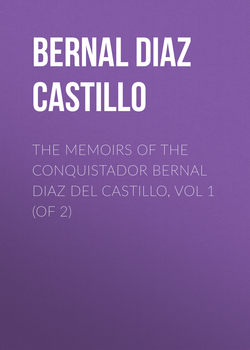Читать книгу The Memoirs of the Conquistador Bernal Diaz del Castillo, Vol 1 (of 2) - Bernal Diaz del Castillo - Страница 8
CHAPTER VII
ОглавлениеThe fatigues I had to undergo, until my arrival in the town of Trinidad.
I have already above related that I with some other soldiers who had not quite recovered from our wounds remained behind in the Havannah. As soon as the latter began to heal a little we three made up our minds to go in company with a certain Pedro d'Avila, an inhabitant of the Havannah, to the town of Trinidad. This man was going to make a voyage in a canoe along the south coast, and had taken a lading of cotton shirts, which he intended to dispose of in Trinidad. As I have above stated, these canoes are hollowed out of the trunks of trees, after the manner of our bakers' troughs: in this country they are used for coasting; and we had to pay Pedro d'Avila ten doubloons for the voyage.
As we were coasting along, sometimes rowing, sometimes sailing, we arrived after the eleventh day in sight of an Indian village, subject to the Spaniards, and called Cannareon; there arose at night-time such a terrible gale of wind, that, although we rowed with all our strength, we could not keep the sea any longer. Notwithstanding every exertion of Pedro d'Avila, of some Indians from the Havannah, and several other good rowers we had with us, nothing at last remained but to run the canoe aground between the steep rocks. The canoe was dashed to pieces, the whole lading of Pedro d'Avila went to the bottom, and we made the best of our way on shore, naked as the day we were born, our bodies cut and bruised all over by clambering over the rocks, for we had stripped ourselves of our clothes in order to be the better able to swim, and also, if possible, to save the canoe. As we had only escaped with our lives among these rocks, none other choice was left us than to continue our road over them to Trinidad, which lay along the coast through a barren country full of rugged rocks, where our feet soon became blistered and wounded; as to think of getting anything to eat was quite out of the question; while we had continually to struggle with a terrific gale of wind and the sea breaking over the rocks. Although we had not neglected to cover our bodies as much as possible with leaves and herbs, we nevertheless got sore boils between our legs, which bled very much. At last we could proceed no further; for the sharp stones had covered our feet with wounds: we managed, however, with considerable trouble to reach a more elevated spot. None of us having his sword left, we contrived by means of sharp stones to loosen the bark of some trees and bind it as well as we could under the soles of our feet, with the tendrils of climbers, which grew among the wood. And in this way, after suffering great fatigues we reached a sandy district on the coast, whence in a couple of days we arrived in the Indian village Yeguarama, at that time the property of Bartholomeus de las Casas,3 who was a priest. I knew him afterwards when he belonged to the order of the Dominicans, and became bishop of Chiopia. Here the Indians gave us to eat, and on the following day we arrived at another village, called Chipiona, which was the joint property of Alonso de Avila, and of Sandoval, but this was not the captain of the same name who gained such vast renown in New Spain. From this place we at last came to Trinidad, where I had an acquaintance, by name Antonio de Medina, who provided me with a suit of clothes as they were worn in that town; my comrades were similarly provided by other of the inhabitants. Quite worn out by fatigue and miserably poor, I set off for Santiago de Cuba, where the governor Diego Velasquez resided. He was just then busily engaged fitting out another squadron, and was highly delighted at seeing me again when I called upon him, for we were related to each other: and as one word led to another, he asked me if my wounds were sufficiently healed to make another trip to Yucatan? I could not help smiling at this and said, who gave the country that name? for the natives do not call it so. "So Melchior, whom you brought with you, calls it," resumed he. "Call it rather, (said I,) the land where they killed one half of our men and wounded the other." "Well, (said he,) if you have undergone many fatigues, you have only shared the same fate with all others who have ventured out on the discovery of new countries. But, on the other hand, you will not fail to be highly honoured and rewarded by his majesty the king, to whom I will transmit a faithful account of all this. Therefore, my friend, you may in all safety join yourself to the squadron I am now fitting out, and I will take care that you shall have an honorable post." What further happened I will next relate.
3
This is the celebrated Las Casas, the protector of the rights of the Indians. (p. 18.)
